The Best Man: The Final Chapters Stars Say Goodbye to Their Beloved Characters
The stars and executive producers Malcolm D. Lee and Dayna Lynne North offer some insights into the end of the franchise. "We want all the tomatoes," Taye Diggs proclaims about his hopes for the (currently very Fresh) series.
It’s so hard to say goodbye to what began in 1999 with groundbreaking Buppie romantic comedy The Best Man. And for a generation of fans, it may feel like it’s still too soon.
Having produced two movies in the franchise, the first and 2013’s The Best Man Holiday, executive producer/director Malcolm D. Lee is ending the story of these friends with the series The Best Man: The Final Chapters, debuting all eight episodes on Peacock on December 22. Lee feels the time is right to bring some closure. The good news is that The Final Chapters is eight episodes, so getting to closure will take a while.
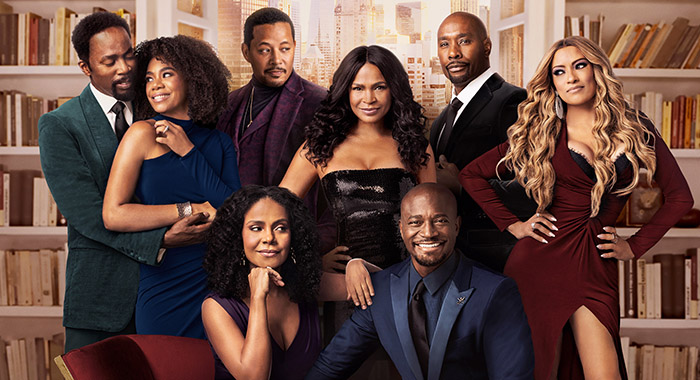
(Photo by Peacock)
Lee and cast were in a jovial mood — poking fun at themselves, each other, and sometimes this interviewer — when Rotten Tomatoes interviewed them. If they all seem at ease with the ins and outs of sitting for promo interviews, they’ve certainly earned it since the first film in the franchise was released. Terrence Howard (who plays Quentin in the franchise) found huge fame starring in Fox’s Empire and was a 2006 Best Actor Oscar nominee for his role in Hustle & Flow. Regina Hall (Candy) has starred or co-starred in a slew of successful movies and TV projects including Girl’s Trip, the Scary Movie franchise, and recently was one of three female performers (alongside Amy Schumer and Wanda Sykes) who hosted the Oscars last spring. When not making movies, Morris Chestnut (Lance) has starred in several TV shows, including Rosewood and The Resident. Sanaa Lathan (Robin) went on to star in the romance classic Love & Basketball and starred in Netflix series Hit & Run recently. Melissa De Sousa (Shelby) has appeared in numerous TV and film roles, including with Sandra Bullock in Miss Congeniality and more recently in The CW superhero story Black Lightning. Taye Diggs (Harper) and Nia Long (Jordan) achieved star status earlier in their careers; Diggs as part of the original Broadway cast of Rent and opposite Angela Bassett in How Stella Got Her Groove Back, while Long appeared in Boyz n the Hood with Chestnut and went on to appear in Friday, Love Jones, and Soul Food. Before The Best Man, Harold Perrineau (Julian) appeared in TV series Fame and Baz Luhrmann film William Shakespeare’s Romeo & Juliet, but the actor later appeared in two Matrix films and Oscar-nominated Zero Dark Thirty and starred in TV’s Lost.
Lee, writer Dayna Lynne North, and the now well-established actors offered insights on the franchise and its “Final Chapters” when we spoke.
Diedre Johnson for Rotten Tomatoes: Everybody seems so relaxed in their bodies when they’re doing this series. When you direct, is there anything that you tell the actors to do to sort of achieve this real relaxed friendship kind of look?
Malcolm D. Lee: I don’t know. I think because they’ve played these characters in two different movies now, and many of them have been known for these characters. it was easier for them when they [got] into scenes together.
And there’s little reminders that I have to give them here and there. Like, “OK, you’re doing too much here,” or “bring this back.” They were reminded of what they had done before and what their relationships are and what the history is between them, so it’s always a little bit modular, but very small adjustments that have to be made
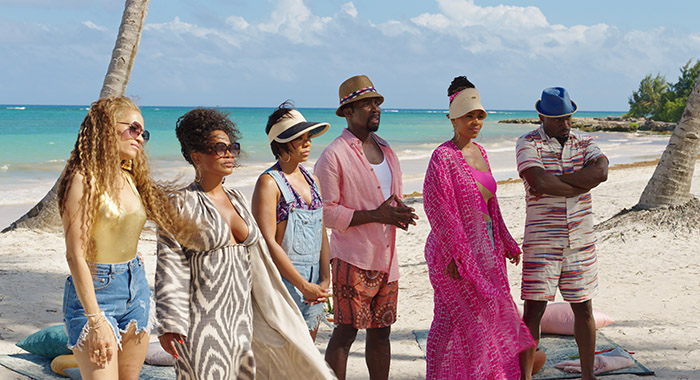
(Photo by Peacock)
As a director, what is it that you want the audience, say an audience that hasn’t seen the other movies, to get out of this?
Lee: Who hasn’t seen The Best Man? I mean, come on. Listen, I think that it’s another stage of life, right? It’s adulthood for real, right? There’s a lot that’s going on. We’re in the sandwich years. These characters are in the sandwich years. They got kids on one side; they got their parents on the other. They are evolving as individuals. They’re evolving as couples. Are they going to grow together? Are they going to grow apart? Are they growing at the same rate? Do they want different things? Different things are happening within their bodies both internally and externally that they don’t really have control of. That they’re different from when they were in their twenties? So I think that it’s just a relatability, and to me, the bigger overarching thing is normalizing Black life in America. These are human beings who just happen to be Black.
That’s what I’ve always gotten from it. Why are you ending it?
Lee: You got to leave them wanting more. I just feel like this is all the story that I had to tell. Perhaps there’s something that will pop up years down the line. But I feel the same way I felt about the first Best Man. It’s like, I’m not going to revisit these characters. Maybe in maybe 10 years. But now I feel like this is a good way to end the series and end the franchise. And I think it’s on a good note.

(Photo by Peacock)
I have so many questions about what happens in the writer’s room. Can you tell me a little bit about what was discussed initially for the series?
Dayna Lynne North: I love writer’s room questions. When Malcolm invited me to join him in this phase of the journey for adapting the franchise for television, he was very open about the fact that he has, as we all know, this amazing film career, but television is a different beast. We were just excited about the idea of how we wanted to arc out each of these characters in their journey.
We had eight episodes, and it was really the question of where do we want to catch up to these characters? And for me, one of the things that I brought to him that was exciting was the idea of midlife metamorphosis. We’re 20-something years from when we first met each of these characters and what does that mean?
At this point in their lives, what are they excited about? What’s challenging them? We’re in a post-pandemic world — or in a still-pandemic world — but we wanted to also be authentic about where we are in the world as well. What are the challenges that are going to be facing them living their Black lives in this year, 2022?
And there’s the gap to fill a little bit between The Best Men Holiday and now. Where do we want to find them and how do we want to challenge them? And where do we want to leave them knowing that it is the final chapters that the audience will experience with them. Where do we want to find them? How do we want to challenge them? And where do we want to leave them? And we just did that for each character.
Regina Hall, Morris Chestnut, and Harold Perrineau
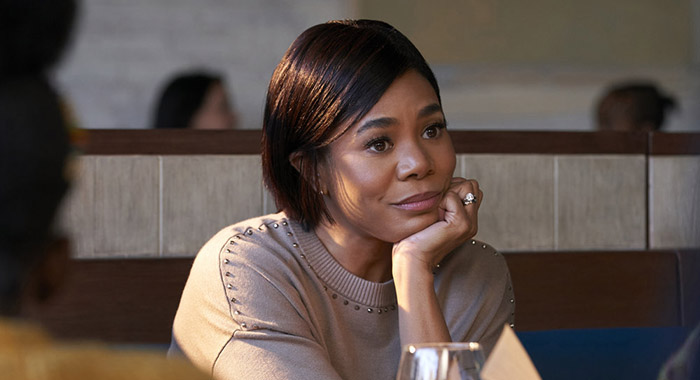
(Photo by Clifton Prescod/Peacock)
You guys have all done so many projects. How do you leave all these different characters that have happened in the last 20 years, and just fall back into this friendship movie — well, series now?
Regina Hall: You know how there are people in your life, friends that you may not speak to for years? You get on the phone, you have a conversation, and you pick up right back where you left off. It feels like that. It feels really natural and organic. It’s like we’ve lived with them. We know who they are, and then we know each other in real life so it just feels kind of effortless.
Morris Chestnut: Effortless is a great thing to say because I’ve worked on projects, and after a week or so, I was like, “I think this is the last time I will ever work with this person because I can’t do it.”
I think we all — aside from Regina not liking me — I think we all genuinely like each other and we really enjoy being around each other. To be able to revisit these characters and this project has been great.
Harold Perrineau: And as I’m sitting here thinking about it, I can’t think of another project I’ve seen that’s gone so many years with people that know each other so well.
What did the first film do for your careers?
Hall: I didn’t turn into a household name, but I got to meet some great people and it was my first project, which led to a second project and the third, so it was the beginning of me working. And for me, it was incredible because I was really such a fan of everybody.

(Photo by Nicolas Cordone/Peacock)
Chestnut: Except for me.
Hall: No, I was a fan of everyone. I didn’t know everyone. Obviously, I knew Nia. Sanaa was new for me. I obviously knew Harold. I knew Morris and Terrence. I was a fan of Monica Calhoun. Just to discover people whose work you love and then watch their careers grow, it’s honestly, it’s kind of amazing to all of us. I was a fan coming into a world with people who I admired and respected and just thought they were so great.
Chestnut: That’s a great answer. And then after the stripper scene, I was a fan of Regina and her wardrobe and her abs, [looking at Hall] I’m sorry, girl. Go ahead. Next question. I apologize.
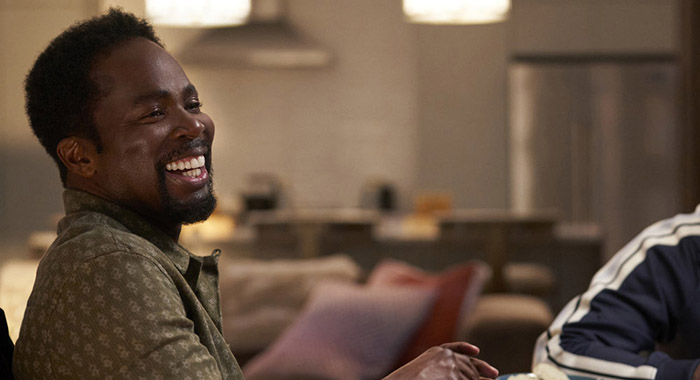
(Photo by Clifton Prescod/Peacock)
Define how it feels for this to be the last time.
Perrineau: It really is bittersweet. Again, like I said, we love seeing these people, we love seeing these characters, and it’s going to be sad to let them go. But they’ll live with us. They live. They literally live with us all in our country, in the world, in the cinematic world that exists out there, so you feel sad to see them go, but you’ll always be able to reach out and touch them again. You know what I mean?
Hall: Yeah, it is. It really is. I have to say that.
Chestnut: I agree.
Hall: And you know what, it takes a lot to get something made with this many people. So that process is one of its own, but then when it finally gets made and it’s done, and then you look and then you see each other, [you think,] This is actually really special. Honestly, when we get to do press together … that’s great for us.
Melissa De Sousa and Terrence Howard
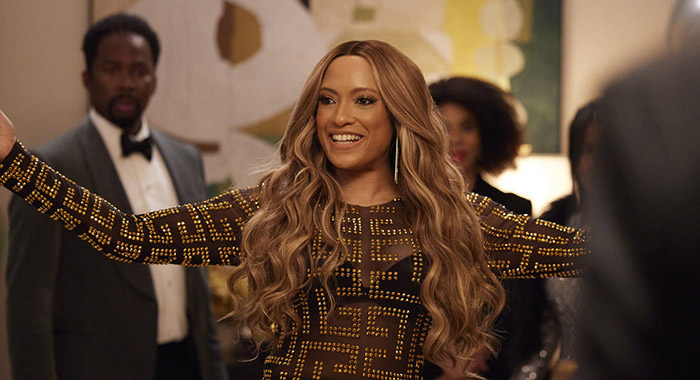
(Photo by Jocelyn Prescod/Peacock)
It’s great to talk with you. I don’t even know what to say, except that Shelby and Quentin, what in the world is the real attraction between you two?
DeSousa: Opposites attract, right? It’s a combustion. We’re combustible when we come together.
Howard: See? And that’s —
DeSousa: Fireworks.
Howard: Yeah, that’s the reality. They lied with that crap about opposites attract. It’s not opposites attract. Hot water and cold water move in the opposite direction of each other. Opposites repel each other. It’s really the positive attributes that we really have in each other that makes us want to war. Each one is trying to find its own plane that it’s going to be able to spin into where it won’t be in competition, and the only way for that to happen is for them to completely polarize. Now, they can spin in harmony with each other, so it’s just to take whatever it takes to get universal balance.
DeSousa: And clearly, they have to have drama. I know I like a little drama in my relationships. And obviously, Quentin does, too.
Howard: Every time you exhale, you’re creating drama. Your body’s like, “Uh-oh, oxygen is missing. Somebody better — endorphin. OK, breathe.” So drama: all of those things are necessary in order for the growth. Remember Khalil Gibran said, “When somebody’s dying, what are they going through? Is it the breaking of the shell that’s necessary in order for life to come forth?” We have to reorient our perspective on drama.
Have either of you had someone like that in your real life that you can draw off of?
DeSousa: Yeah, Terrence. I’m kidding!
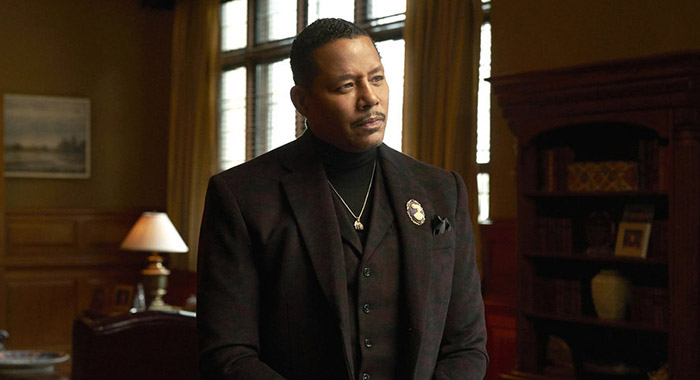
(Photo by Clifton Prescod/Peacock)
Howard: What’s interesting with these characters is there’s a reality under the surface of all of that. Because as an actor, we have to find some sympathetic harmony, some resonance with it. And after doing and playing with a band for 24 years, really, you are part of the band. And when you’re singing a song, that song has personal attachments.
DeSousa: Yeah. I don’t see how you can have any relationship. I’m sure there’s some relationships that are picture perfect. I’ve not had one. So obviously, you bring whatever parts you can of yourself or your life into the work.
Howard: And that’s what ultimately makes it perfect. It’s how it fits together and works to fit together.
What is best for them?
DeSousa: The sex! No, I think that they get each other. What do you think?
Howard: I think the universe has brought them together for a reason, and it’s always with a bang. I think they should explore that universal purpose and what it is that they’re supposed to be doing together.
DeSousa: And they balance each other out. It’s almost like they need each other but they didn’t know that they needed each other. They found that out with the back and forth throughout the years. And then when they were apart, they realized they really needed to be together.
Howard: What’s the name of that movie with Will Smith where he was the —
DeSousa: Where he’s a superhero? Hancock.
Howard: Him and Charlize — it’s that relationship.
DeSousa: Whenever they came together, the wall blew up. But it’s still like they were just drawn to each other.
Howard: So it’s that. It’s a natural battle. It’s beautiful.
Taye Diggs and Nia Long

(Photo by Clifton Prescod/Peacock)
Diggs: We have a question for you. With Rotten Tomatoes … and the rating system.
Long: Right. So the more tomatoes you get, the better you are, right?
It’s the percentages, yeah. If you’re going to get 37%, for example, it’s not good.
Diggs: 30% of Rotten Tomatoes?
Of a 100%.
Diggs: Oh, Rotten Tomatoes. Tomatoes that are Rotten though, right? OK. That’s where it throws me off. Because if they’re Rotten Tomatoes, I would think you wouldn’t want the Rotten tomatoes.
Long: You want the good tomatoes.
Diggs: Right. You’d want a lesser amount of the Rotten tomatoes. But in this situation, the more Rotten tomatoes you have, the better. Correct?
Or you want tomatoes that are so ripe, they’re almost rotten.
Long: OK. Now, I’m totally confused. But I just hope that we have the right tomatoes.
Diggs: Yes. All of them.

(Photo by Matt Infante/Peacock)
Long: That’s all that matters. The Best Man: The Final Chapters …
Diggs: We’ll take the Rotten, we’ll take the ripe ones. We want all the tomatoes.
Long: Yeah. I love tomatoes.
You already have it with the first two films. [Both are Fresh.]
Diggs: Thank you.
You guys are funny. First of all, Taye, your character has the career that all writers want, and I’m just wondering if you’ve ever thought about it yourself, about having a writing career?
Diggs: You know what? I remember my third-grade teacher, Mrs. Evans, said that I was going to be the next Alex Haley.
Long: What?
Diggs: Yep. In third grade. Alex Haley, for you young people, wrote Roots. The young people that don’t know Alex Haley probably don’t know Roots, so it doesn’t matter. I’m an actor, so obviously that didn’t work out. But … My son writes.
Long: [And] will be like Alex Haley.
Diggs: My son writes. Yes, yes. I don’t have the patience to, and I also don’t know how to type. So those are my excuses.
Long: But you make a lot of money, so you could probably hire someone to help you. Anyway. Next question. I don’t want to put him on the spot.
Diggs: That’s OK.
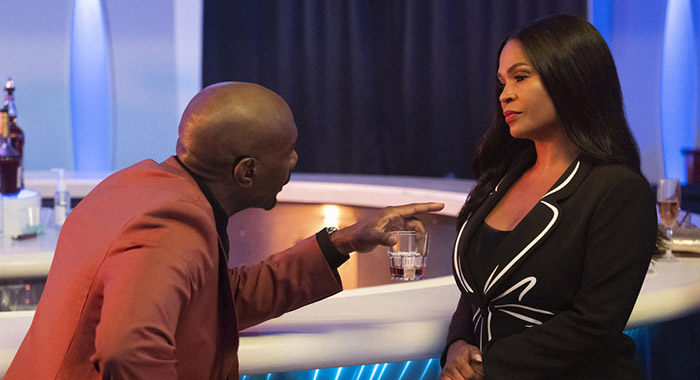
(Photo by Matt Infante/Peacock)
So Jordan is going through something where she’s getting everything that she ever wanted in her career but there’s something more that she wants now?
Long: Yes.
And it may be making that a little less of a priority than what it would be. What do you say to young women who can look at this and say, “Well, what’s happening with her? She’s getting what I want. She’s getting everything that I have worked for. Why isn’t she happy?” Can you explain that?
Long: I think it’s really important to live your life with balance. I think you have to breathe through life and not just think through life. Because when you just think through life, you’re not allowing spirit to lead you. When you are in the space of breathing through, you can actually trust yourself and your decisions are based on what feels good in your gut, rather than constantly thinking about those goals that you need to achieve.
Diggs: You’re mixing the personal character. Yeah.
Long: It’s so true. We have to depend on something that’s bigger than someone saying —
Diggs: The cerebrum.
Long: Yes. And then someone just saying they choose you, because you’re not going to always be the chosen one. So there’s got to be something else in you that moves you to greatness.
Diggs: Well said.
Long: Spirituality. Breakups —
Diggs: Breakups.
Long: — are very important. Anyway, next question.
I wish I could. Gotta wrap it up. Taye, keep following me since you follow everybody.
Diggs: OK, I will.
Long: He’s good on social media, isn’t he?
Diggs: Somebody is.






